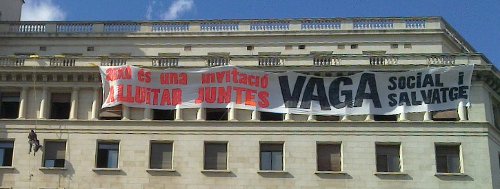silence on the wire
It's been pretty quiet in this electro-rag, and for a simple but profound reason. I don't know about all of Maslow's hierarchy of needs, but for me there is definitely a hierarchy between housing and anything else.
Thing is, my partner and I drove up to Geneva almost three months ago, but we only moved in somewhere permanent last week. Everything was up in the air! Sublets and couches and moving vans and storage units. All the things in all the places.
In a way it should have been liberating, but I reckon I'm just a homebody: someone who likes to have a spritual and physical base to come back to. It's the classic introverted/extroverted "where do you get your energy" thing -- in private, or in society? Of course it's both, but for me the private side is important and necessary.
society, nations, states
Incidentally, October made ten years since I left the US. I lived in Namibia for a couple of years, moved to Spain in 2005, and as you know, left for Switzerland in September. In that time, a third of my life, I have not been able to vote for my local government. Representative democracy isn't very democratic, of course, but not even having that nominal connection to collective decision-making is a bit unmooring.
In Spain I have what is called "EU long-term residency". In 2003, the EU standardized visas for "third-country nationals": folks like me that do not have citizenship in a EU country. After 5 years, you automatically get country-specific "long-term residency", and can optionally apply for "EU long-term residency" (as I just did), which has the additional benefit of being transferable to other EU countries.
The idea of EU long-term residency was to make third-country nationals have the same rights as EU citizens, but several restrictions placed on the agreement by individual nations make it not very attractive compared to full nationality. EU citizens have the right to move around the EU, whereas third-country nationals have to apply to do so.
And in many countries, you can get nationality just as easy as long-term residency. In France for example, you only have to wait 5 years to be able to apply for nationality. In Spain, if you come from a Latin American country, you only have to wait 2 years (in theory; I have heard of unreasonable delays). As that is not my particular case, I would have to wait 10 years to get Spanish nationality, making this "EU long-term residency" attractive. However if I move away from Spain officially, I would have to "start over".
Man. The EU. What a bizarre institution. I think few normal citizens can describe the structure of the the EU -- you know, what's the deal with the parliament and the commisioners and the president and the central bank? The operations of the EU have very little to do with democracy. The tenuous accountability of the Members of European Parliament is mostly to political parties rather than to the people. Finance in rich countries basically runs the bank. The commission seems to run itself, with limited accountability to the governments of member states. To the extent that the EU is a democracy, it is its weakest form: vast, physically removed from its constituency, composed of representatives of representatives.
and yet
It's been interesting to see the contrast in Switzerland. Switzerland has its own currency, protectionist trade policies, and a smattering of EU-à-la-carte. So, yes, it is relatively easy for EU citizens to move to Switzerland, but on the other hand it's quite difficult if you are a "third-country national" like myself.
Switzerland is also very local. Most legislation involves the citizens directly, via referendum. The other day, voters here just approved a new constitution, by simple majority, for Geneva. Contrast this to the EU, which centralizes its power more every year.
There are good things and bad things about this. I suppose that specifically, it's mostly good for the Swiss, neutral for EU nationals, and worse for third-country nationals. Policies that enable local agricultural and industrial production are great for local workers, businesses, consumers (with Swiss salary), and the environment. These policies are quite difficult to have in the EU. Even the existence of the Swiss franc is great for local decision-making power, although its policies are mostly controlled by finance.
On the other hand, the immigration policy is quite reactionary, often bordering on xenophobia. In the EU, the institutions were able to achieve some limited forms of freedom of movement of persons, including third-country nationals, in exchange for the freedom of movement of capital. No such arrangement has been made in Switzerland. (They'll happily take your capital, of course.)
As you probably know, I mostly identify as an anarchist, a kind of libertarian socialism that is suspicious of hierarchical power structures. So Switzerland has its attractions in that sense. But I've had discussions with folks arguing that the EU has actually been the emancipatory institution, in contrast to reactionary governments, and there is something there. For all its decentralized, democratic principles, women did not get the right to vote in Swiss federal elections until 1971, and the last canton (local government) held out until 1990, when it was forced to allow women to vote by a federal court.
capital
There's no way around it: Geneva stinks of money.
An illustration, if you don't mind. When we first came here to visit in August, we got out of the car, went to a cash machine, and tried to get out 120 francs (approximately 120 dollars, or 100 euros). No. The minimum amount was 100 francs, and the next was 200. Well, OK. We got 200. It came out in two bills. The machine did not dispense any lower denomination. There was nothing wrong with that machine; it was marked as only dispensing 100-franc bills and higher.
On the other hand, unlike Spain, all shopkeepers carry around fat bankrolls and are quite happy to break a 100, even on a 50 cent purchase. You can do that only if you can find something that costs that little, of course.
If you walk around the center of town, it's designer tailors, caviar bars (not kidding), and private banks. It is truly disgusting. It makes me think of a butcher's counter: bleach covering a faint smell of blood, but without the redeeming earthiness. Perhaps this is just a personal analogy though.
That's the macro-level. Of course there are normal folks here too, but that's tempered by the cost: things are in general really expensive here. Starbucks drip coffee for 5 dollars. You can easily spend 70 dollars a person at a normal restaurant. A normal one-hour tram ticket is 5 dollars. Etc.
From what I can tell, the cost of things is not a problem if you have a Swiss salary. I'm in something of an irregular state: an American with Spanish residency, working for a Spanish company, living in Geneva (but actually France). Administrativia aside, it has been quite a shock coming from Spain to here. In Igalia, the cooperative I work at, we try to pay everyone the same when everything is going well, but when the budget is a little tighter salaries get scaled down to something approaching "the cost of living" (whatever that is).
We had to open a whole new round of discussions about how to determine compensation after I moved here. Geneva just didn't fit in anyone's conception about what was reasonable! It raises all kinds of issues: what does it mean to work in a cooperative with people in all different kinds of places? What does fair and equal compensation actually mean in San Francisco and A Coruña and Madrid and Geneva, and how do you calculate it? It looks like we've come to an interesting and probably unique solution there, so perhaps more on that as discussions progress.
borders
Of course it's strange to come to this capital of, well, capital with these values, but here I am. You end up talking about money a lot. Of course you need a place to put your money and take it out. For an anarchist I've got a lot of bank accounts: Spanish, Swiss, French, and US somewhere... For all the new EU regulations, cross-border ATM fees still make it attractive to have an account in the place where you need to withdraw money.
Same thing with mobile phone companies. As I said, we ended up moving to France. The rent is a lot cheaper, it's more compatible with our residency permits, and it's still only a 25 minute bike or tram into the center of Geneva so it's not totally in the boon-docks. But this makes me carry around two phones because I cross the border all the time, and then of course there's the old Spanish SIM I need to do something with. I've done the PIN-to-PUK dance multiple times, because I can't remember so many numbers.
It's a pretty strange identity to have: to have a house in France, but feel attached to Switzerland. It's tough to catch the dominant social story, of who is the "us" in this place. It's problem with Geneva in general, transient city that it is.
greenery
Well, this post grows long, and it's mostly a rant, right? And I needed to rant and be done with it. But I don't want to be too negative. We have an actual house, with a garden, and we're going to plant things and compost and such. It's warm and cozy inside and there are snowy mountains about, and there's a cosmopolitan city within a close if brisk bike ride. I have a French grocery store five minute's walk away. It's a dark season, but there is cheese and wine enough to carry me through to springtime :) So things are good. I'll still rant, but things are all right.
Bon. Catch you internauts later. Next time, with code!






